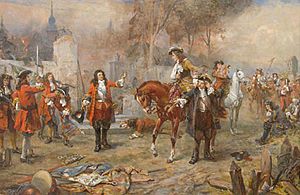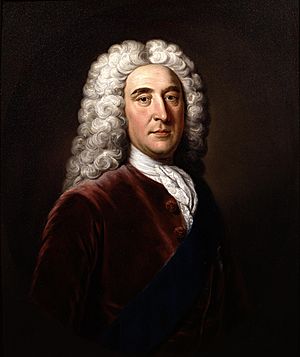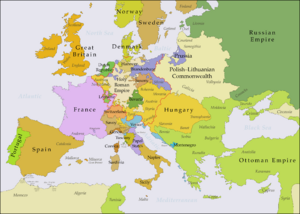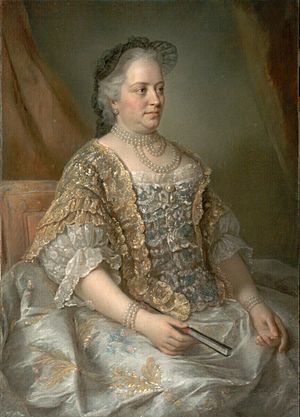Anglo-Austrian Alliance facts for kids
The Anglo-Austrian Alliance was a special agreement between Great Britain and the Austrian Empire. It lasted from 1731 to 1756. This alliance was mainly set up by a British leader named Thomas Pelham-Holles, the Duke of Newcastle. He believed that working with Austria was very important. It would help stop France from becoming too strong in Europe.
This alliance was part of a bigger game in Europe. Major countries often changed who they were friends with. They did this to keep a balance of power. This meant no single country could become too powerful. When the Anglo-Austrian Alliance ended in 1756, it led to the Seven Years' War.
Contents
Why the Alliance Started
Before this alliance, Austria had signed a treaty with Spain in 1725. Spain wanted to take back Gibraltar from Britain. Britain was then allied with France. But this friendship was getting weaker. By 1731, Britain and France were becoming enemies again.
In 1727, Spain tried to take Gibraltar by force. British diplomats talked to Austria. They convinced Austria not to help Spain. This made Spain stop its attack and make peace.
Many important British leaders, called Austrophiles, wanted an alliance with Austria. They saw Austria as the only country that could stand up to France on land. A key opponent of this idea, Lord Townshend, left his job in 1730. This made it easier for Britain and Austria to become friends. The Duke of Newcastle then had more say in Britain's foreign plans. He was sure that an alliance with Austria was absolutely necessary.
Making the Alliance Official
In 1727, Austria agreed to stop its Ostend Company. This company traded overseas and caused problems with Britain. This agreement helped pave the way for the Treaty of Vienna. This treaty officially created the alliance between Britain and Austria. It was signed on March 16, 1731. Important people like Prince Eugene of Savoy and the British envoy Earl of Chesterfield signed it.
A big win for Britain was the complete shutdown of the Ostend Company. Both Britain and Austria promised to protect each other if attacked.
However, the alliance faced a challenge soon after. Austria expected Britain's help in the War of the Polish Succession. But Britain did not join this war. The British government thought Austria was attacking the rightful Polish king. This made the alliance quite tense. But later, both countries found common interests again. This helped to strengthen their ties.
Supporting Austria in War
Britain gave a lot of help to Austria during the War of the Austrian Succession. British troops fought alongside Austrians. Britain also sent large amounts of money. This money helped Maria Theresa keep her throne in Austria. This was important because some rules said a woman could not rule.
By 1745, Austria seemed to be in great danger. It looked like Prussia and France might take over and divide Austria. But Britain launched a campaign against the French in Flanders. This made France move many of its soldiers away. This allowed Austria to fight back.
Britain also used its diplomatic power. It convinced Frederick the Great of Prussia to agree to a ceasefire. This was called the Treaty of Dresden. It allowed Austria to focus all its efforts on fighting France.
The alliance was not always smooth. Austria felt Britain did not do enough to stop France from taking Brussels in 1746. This caused more disagreements.
The biggest problem came during the Congress of Breda. This meeting aimed to end the war. It led to the Treaty of Aix-la-Chapelle in 1748. Britain wanted the war to end quickly. They were annoyed by Austria's slow progress in agreeing to the terms. Britain even threatened to sign the treaty alone if Austria did not agree within three weeks.
Austria signed the treaty, but they were not happy. They felt they gained little from the war. However, Britain thought the terms offered by France were very good.
Despite these issues, the future of the alliance looked promising. Austria had a strong supporter in the Duke of Newcastle. Austria also seemed to have no other major allies. Britain saw the alliance as part of Newcastle's plan. This plan was to keep Germany safe by linking Britain, Hanover, Austria, and the Dutch Republic.
The Alliance Breaks Apart
In Austria, some people still suspected Britain was not fully committed. They pointed to Britain not joining the War of the Polish Succession. They also noted Britain's failure to get Silesia back for Austria in the 1748 treaty. They believed Britain only cared about the alliance when it helped Britain's own goals. A key person who did not like Britain was Wenzel Anton Graf Kaunitz. He became Austria's Minister for Foreign Affairs in 1753.
In 1756, Austria suspected that Prussia was planning to attack Bohemia. Austria also feared Britain would not help them. This was because Britain was busy with a fight against France over the Ohio Country. So, Austria made a new alliance with its old enemy, France. This was a big change!
Britain was left without an ally. So, it quickly made an alliance with Prussia. Britain hoped this new balance of power would stop a war.
But Britain could not control its new ally, Frederick the Great of Prussia. He attacked Austria in 1756. Britain then stood by its promise to Prussia. This created the Anglo-Prussian alliance. Britain and Austria did not declare war on each other. But they were now on opposite sides in the Seven Years' War. During the Capture of Emden in 1758, British and Austrian forces almost fought each other. Austria tried hard to get Silesia back during the war. But it failed. The 1763 Treaty of Paris confirmed that Prussia would keep Silesia.
What Happened Next
Britain became less and less fond of Austria. The British leaders who supported Austria lost their influence. This happened during and after the Seven Years' War. Austria was now seen as too strict and against British ideas of freedom.
In 1778, France joined the American War of Independence. France wanted to help the American colonists become independent. Britain tried to get Austria to help them stop the rebellion. Britain thought if Austria joined, France would have to send troops to Europe instead of America. But Austria refused to even think about it.
Britain and Austria did become allies again later. This was during the Napoleonic Wars. But they were part of a larger group fighting France. Their relationship was not as close as it had been before. Again, British money was very important. It helped Austria put armies into the field. For example, Austria received a lot of money during the 1793–1794 campaign in Flanders.
See Also
- Austria–United Kingdom relations
- Anglo-Prussian Alliance
- Great Britain in the Seven Years' War
 | Ernest Everett Just |
 | Mary Jackson |
 | Emmett Chappelle |
 | Marie Maynard Daly |





